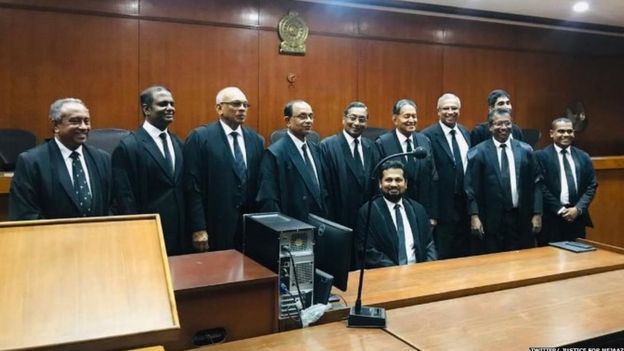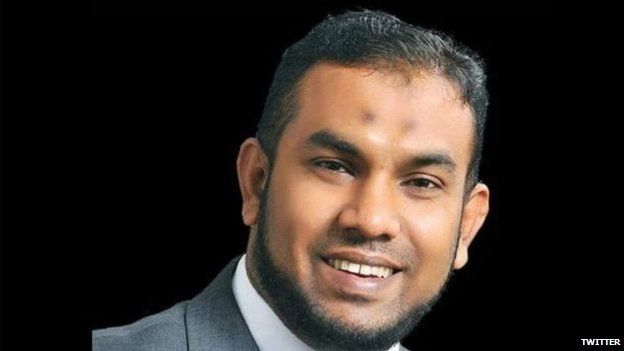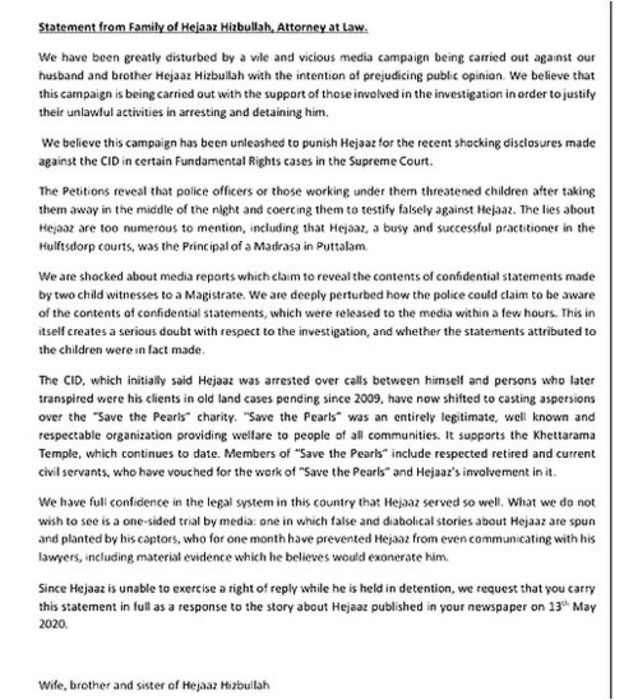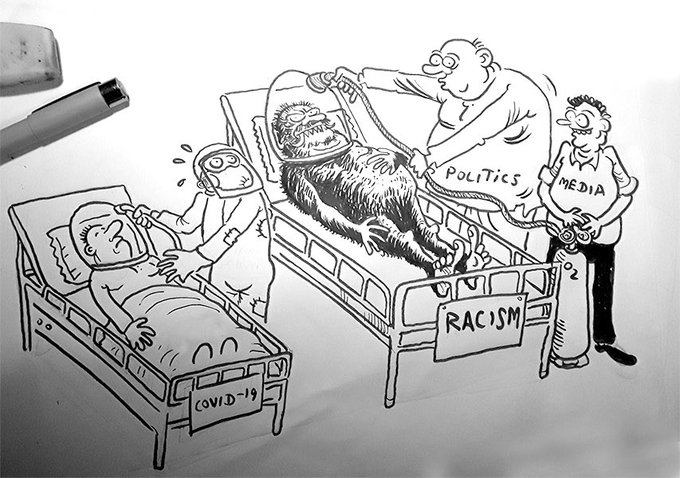August, September dates discussed for polls
Bills from 2019 presidential election not paid
My US citizenship oath nothing to be ashamed of
National Elections Commission (NEC) member Ratnajeevan H. Hoole has not been in good terms with NEC Chairman Mahinda Deshapriya in recent times and this has been evident in statements Hoole has made to the media. In an interview with Dailymirror, Hoole opens up on his issues with Deshapriya, concerns over the proposed dates for the parliamentary election and several other matters. Excerpts:
Q There was a lot of debate with regard to the postponed parliamentary poll and now the NEC has picked June 20 to hold the election. Why June 20?
Many have asked why we chose the President’s birthday. I was not aware it is his birth date. Superstition is suggested because the President who did well on November 16 (1+6=7) had set April 25 (2+5=7) for the parliamentary election.
However, on the morning of April 20, as soon as I came to my commission office, Chairman Mahinda Deshapriya (MD) took issue with me over my letter to the commission which he claimed I had given to the press. I responded that a newspaper had it and asked me to confirm I had written the memo, which I did. I added that after that, since it was public anyway, I gave copies to a few who asked for it.
Fortunately, as the argument heated up, Nalin Abeyesekere, PC (NA), crashed in and he was upset that the chairman asked me to agree to May 28 and he knew nothing of it till he read my memo (I feel free to discuss this because a senior journalist who called me that noon recounted every detail of our conversations on the 20th, telling me “I have three good sources in the commission offices.”)
NA held, and I agreed, that we had postponed the April 25 date because of COVID-19 which as of the twentieth morning had got worse and there was no reason to go back on that. Both NA and I said the June 2 deadline for the new Parliament to meet was impossible and a new date should be as late as possible due to COVID-19. MD insisted on a rationale for a date. It was time for our 11 o’clock meeting but I insisted on finishing this matter before leaving my office. All three agreed it should be September 2 (five years after Parliament had met) or August 17 (five years after Parliament had been elected).
"The press too played a subservient role. You folk call the Chairman Head of the Commission. The Commonwealth Secretariat calls him Chief. Editors continue to call him Commissioner when there is no Commissioner. You thrive on sucking up"
After the meeting, MD reopened the date and wanted July 15 with no particular rationale. Then, after another meeting, as if to give a rationale, he had a handwritten paper on which he marked dates April 27 (curfew listed as stated by the government), May 2 to ensure COVID-19 was easing and then 7 weeks (5-7 weeks for campaigning as in the Act) taking us to June 20.
At the commission, he banged the table and said he owes his loyalty only to one country and he never went about swearing allegiance to another. Was he meaning Basil and Gotabaya Rajapaksa or me? I must note that my US citizenship oath “to support and defend the Constitution and laws of the United States” has nothing for me to be ashamed of, and I can proudly do that for any democratic state. In contrast, MD was a member of the JVP in its most violent days, committed to overthrowing our democratically-elected government.At that point, I was so relieved to get away from the madness of a May election that I was happy to agree to June 20 and be done with it.
Then in the evening, medical experts met us and were emphatic that no one knew where COVID-19 was going. Dr. Paba Palihawardene, Deputy Director General of Health Services, said “it is highly likely” that COVID-19 would last at least for two years with ups and downs. Dr. Jasinghe was non-committal asking us to decide and that curfews are being lifted.
Later, the commission met again to draft the gazette. The chairman drafted it and gave it to NA who assumed it was as agreed. I had to study the Tamil draft which had the date May 30 for the election. It had to be redone with the right date.
As reported in Dailymirror, (22.4.2020), “the EC yesterday agreed to review [the poll date of 20.4.2020], Chairman Mahinda Deshapriya said.” There was no commission meeting from 20.4.2020 6:00 p.m. till now.
SLMC’s Rauff Hakeem and Nizam Kariapper have declared our decision unconstitutional. Not quite. Yes, Article 70(5) is violated. It is violated not by us but because it is impossible for the new Parliament to meet by 02.06.2020 given COVID-19. Even where curfew is relaxed, only 50% of the workforce is to be called. And then we must keep a one-meter distance. How when during elections we commandeer a workforce as large as 300% of the norm? Violation of 70(5) is a fait accompli. The doctrine of necessity justifies that violation.
Q With some restrictions likely to still be in place by June as a result of coronavirus, do you really think the environment will be conducive to hold an election or is it too soon?
New ways of bypassing these problems of restrictions are possible. But for innovative solutions, laws need to be amended. Examples are internet voting, multiple voting days to ease staff shortages, real powers to punish polls-law violators (at the commission no one knows of anyone who has been punished since the enactment of the 1981 Act, except for little boys who put up posters), making it necessary for the Attorney General to act within a timeframe when we refer a matter to him. And that requires Parliament to be back.
Q Should the old Parliament be convened, in your opinion, on or after June 2 since the election has been postponed from the original date?
It really is the easiest solution. To be a democracy, we need a Parliament of our representatives. Today itself if the President would cancel his gazette of 02.03.2020, everything that flowed from it – particularly the dissolution of Parliament and nomination papers filed – would be nullified. Parliament can then make right all unlawful measures like curfew declaration and the drawing of funds that have been drawn without Parliament.
Q The election is likely to cost more than earlier estimated with election staff having to need protective gear. Has the commission done an estimate on this?
No. We need to decide on new measures. Our offices have been mostly shut during the pandemic. This is why the election to enable Parliament to convene by June 2 is impossible. Even our bills from the presidential election of November 2019 have not been paid.
Q You have been very outspoken in recent times on matters related to the work of the commission. And this gives the impression that all is not well among the three members. Is that the case?
Nowhere do we have three people sitting down together and having the same ideas. But it is important to have trust and courtesy to be able to work together. My main issue is the chairman continuing as a one-man commission. As you know, he was commissioner before the 19th Amendment. After his retirement age, he was kept on extension till 19A was ready.
The intention, if you carefully read the law, is to have three members with one as chairman. The only difference was that the chairman had an extra vote if there is a tie, an unlikely event with three members. The commissioner with czar-like powers could not settle into being a co-equal chairman.
The press too played a subservient role. You folk call the Chairman Head of the Commission. The Commonwealth Secretariat calls him Chief. Editors continue to call him Commissioner when there is no Commissioner. You thrive on sucking up.
Then, the Cabinet messed up the commission. They gave a car to the chairman and only a travel allowance to the two members. This was hardly enough for a few meetings. So the other two members could not travel to the commission on a daily basis nor to faraway meetings. Only the chairman could order a commission car for us and we developed a dependent relationship. Nowadays to come during curfew and COVID-19, I need the chairman to arrange my transport. It seemed that the government and press preferred to deal with one man.
Almost all decisions were by the chairman. Staff who were used to a commissioner still treat the chairman as commissioner. He did their performance evaluations without showing us. He gives press conferences where there is no agreement as a commission on what is to be said and we two sit on either side like dummies.
"Nowhere do we have three people sitting down together and having the same ideas. But it is important to have trust and courtesy to be able to work together. My main issue is the chairman continuing as a one-man commission"
The association of all 25 regional assistant/deputy commissioners has been struggling with issues. Here is their email from August 2018 to the two members but we have not got the appointment they wanted:“This is to kindly inform you that we have made a written request to the Secretary - Elections Commission to get an appointment from two commission members. Even though we made the request to meet you, we did not receive any positive response up to now. Instead, we receive several calls from the chairman regarding this appointment and dictating terms for this meeting.
“Mainly, we do not want to be governed by the chairman’s arbitrary decisions and unethical pressure. This pressure has penetrated our family lives as well. The communication and physical gaps we had with two members is the main reason for these issues according to our knowledge. We never wanted to maintain a gap but someone did.
“Even now, the chairman is trying to limit our representation which is going to meet you. At least we beg you to give us a reasonable time to talk freely. Almost all other District DCs and ACs are willing to express their views on this meeting.
“Our request letter with the Secretary, which we have a doubt whether it communicated to you sirs.”
A meeting was fixed in Colombo on a Sunday. I went there and found the chairman had moved it to Kandy and without transport I could not go.
“This gap” is to have selected subservient staff in Colombo. A minute was generated that the commission devolves its powers to the staff. Since corrected minutes are not given to us, my corrections never came back to me. These selected staff take decisions the chairman dictates. The worst manipulation was the appointment of the Commissioner General through manipulated selection criteria, a closing date advanced and sending the interview invitation late to a good candidate. But Mr. Abeyesekere who was on the interview team withdrew. The chairman now has suggested that the CG be allowed to run the elections.
Although MD denies it, I am informed by senior staff that the gazette dissolving Parliament in October 2018 was prepared by Director Channa de Silva, the two went together to the Presidential Secretariat up to the gate where de Silva alighted from the car and returned, leaving MD to proceed alone.
Q Is NEC really independent as it is supposed to be or is there bias?
You be the judge.
Q There had been calls in the past for the commission to be given more powers. Is that still a key requirement?
We do need more powers, but as writer Tisaranee Gunasekera told me, with independent commissions we also need independent members.
http://www.dailymirror.lk/opinion/NEC-Chairman-continuing-as-one-man-commission-Hoole/172-187114
While Sri Lankan government remains adamant on cremating bodies of Muslim coronavirus victims, despite an earlier decision to allow burials, doctors worldwide have come out with scientific facts to prove that burials, now taking place in more than 180 countries worldwide, do not cause any harm to anyone.
Burial for Muslim corona virus dead victims, according to World Health Organization guidelines and local funeral laws, was agreed all over the world
In a 16 minute video Dr Feroze M Mubarak, COVID-19 Practice Strategy Lead, Clinical Director, SAS North & Central London on scientific facts-Cremation of Covid 19 infected bodies, has explained clearly why in the case of Muslims, Christians and Jews burial should be permitted.
https://youtu.be/NQQxvmgRp08
However here in Sri Lanka the government, contravening its own previous guidelines, remains adamant on cremating bodies of Muslim corona victims. Third Muslim corona victim from Kalutara who died on Wednesday 8 April 2020 was cremated in complete secrecy though Muslims view it as desecration of the deceased.
This was not reported in the mainstream local media known for its hostility towards Muslims. Instead ,perhaps to justify the cremation, a section of the media published a fake news saying that the Sharjah in the United Arab Emirates has cremated Muslim corona virus dead.
This misleading report was categorically rejected by the UAE Embassy in Colombo.
There were also increasing reports from Human Rights Watch and numerous local organizations accusing the local media of undertaking a planned campaign to associate Muslims with corona virus, as it is happening in India, to poison the Sinhalese minds against Muslims.
The island’s helpless and voiceless Muslims community is seething with anger.
In view of the growing pressure from the Muslim community, Muslim parliamentarians met Prime Minister Mahinda Rajapaksa to appeal to him to allow burial as it is done in many parts of the world.
Prime Minister Mahinda Rajapaksa met them after party leaders meeting at Temple Trees during the first week of this month. When the meeting was about to start Muslim parliamentarians pointed out they would like to meet separate. However the Prime Minister insisted on having the meeting there itself in the presence of others.
Muslim parliamentarians felt uncomfortable with the presence of parliamentarians Wimal Wirawansa and Udaya Gammanpila whose hostilities towards Muslims were common knowledge.
During the meeting SLMC Chairman Rauf Hakeem pleaded not to cremate Muslim corona victims as it violates the religious principles. He supported his plea by citing the World Health Organization circular, government’s own circular and the decision taken by numerous European countries to allow burial of Muslim corona dead bodies.
But, as expected, both Wimal Wirawansa and Gammanpila, opposed and read out statements insisting on cremating Muslim corona victims. This was backed by health ministry officials and the prime minister, insisted on cremating.
Muslims feel that this decision was to punish them for not voting for the government and please the Sinhalese hardliners. They also pointed out that Rajapaksa governments were responsible for Muslims not voting for their governments as memories of their sufferings under them remain fresh.
There were appeals from Muslims and non-Muslims alike to allow the burials of Muslim corona victim’s dead bodies.
For example in a statement issued on 7 April 2020 a collective of citizens and organizations comprising leading civil society members, academics and activists, has written to President Gothabaya to follow WHO guidelines and allow burial.
They urged to consider the MOH Circular of April 1, 2020 and amendments dated March 31, 2020 to the MOH Provisional Clinical Practice Guidelines, and instead follow WHO Guidance on the disposal of bodies. They also called upon the president to address the country’s greatly distressed Muslims and put to rest their fears that they are somehow being punished, or that the country has little respect for their concerns.
The letter has been copied to Health Minister Pavithra Waniarachchi, Director General Health Services Dr. Anil Jayasinghe, Chief Epidemiologist Dr. Sudath Samaraweera, Director of the Infectious Diseases Hospital Dr. Hasitha Attanayake, Chief Judicial Medical Officer Dr. Ajith Tennakoon, Chairperson of the Human Rights Commission Dr. Deepika Udagama and WHO Sri Lanka Representative Dr. Razia Pendse.
They pointed out worldwide, including the Chinese province of Wuhan where the disease was first reported, corona victims were buried,
For example The British government assured Muslim and Jewish communities that they will have their religious burial rights respected and there will not be mandatory cremations.
French President Emmanuel Macron assured that Muslims who die in France during the coronavirus pandemic will be buried in accordance with their religious beliefs and traditions.
In Italy Muslim Covid-19 victims were accorded an honorable Islamic burial and up to ten family members and friends were allowed to attend the funeral prayer from a distance.
In India the Mumbai civic body’s order – that bodies of coronavirus patients can only be cremated, was withdrawn within hours after the state government intervened in the matter.
Urging governments and political leaders not to politicize corona virus issue World Health Organization Director-General Tedros Adhanom Ghebreyesus has warned against using Covid-19 to “score political points”, stating that that he had received deaths threats and has been subjected to racist abuse.
Meanwhile Mariam Ardati, funeral and cemeteries advisor to the Australian National Imams Council (ANIC), said in a statement that Coronavirus cremations would be ‘horrific’
for Muslims, but it was permissible for bodies to be buried in leak-proof plastic bags. This measure was approved by the Islamic body known as the Fatwa Council.
She said” For Muslims, cremation is not only prohibited, it’s viewed as a desecration of the deceased.
“There remains a connection between the body and soul even in death, so this is something that is quite metaphysical, and it’s a very strongly held belief,” explains Mariam Ardati.
“To inflict that type of treatment on the body in death, it’s quite horrific to even consider.” And, according to Ms Ardati, it’s causing panic, “because these are rights that are afforded to people in death, just as someone has rights afforded to them while they’re alive”.
When a Muslim person dies, their body is honoured with four rituals.
First, the body is washed — with soapy water, clean water, then camphor-infused water — then it is wrapped in a funeral shroud, perfumed with incense.
“Then there’s a communal prayer that’s offered for the deceased, and that’s when the whole community comes together,” explains Ms Ardati.
The fourth rite is that the deceased is buried, not in a coffin, but laid directly onto the earth
Meanwhile in an appeal to Director General WHO, Organization of Islamic Countries, OIC, and the United Nations, Furkan Careem from Beruwala has appealed to prevail on Sri Lankan government to allow burial of Muslim corona victims.
https://www.colombotelegraph.com/index.php/sri-lankas-muslim-coronavirus-victims-deserve-honorable-religious-funeral/






